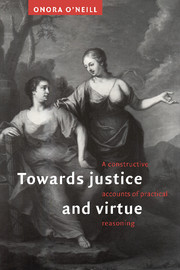Book contents
- Frontmatter
- Contents
- Preface
- Introduction
- 1 Overview: justice against virtue?
- 2 Practical reason: abstraction and construction
- 3 Focus: action, intelligibility and principles
- 4 Scope: agents and subjects: who counts?
- 5 Structure: obligations and rights
- 6 Content I: principles for all: towards justice
- 7 Content II: principles for all: towards virtue
- Bibliography
- Index
1 - Overview: justice against virtue?
Published online by Cambridge University Press: 05 June 2012
- Frontmatter
- Contents
- Preface
- Introduction
- 1 Overview: justice against virtue?
- 2 Practical reason: abstraction and construction
- 3 Focus: action, intelligibility and principles
- 4 Scope: agents and subjects: who counts?
- 5 Structure: obligations and rights
- 6 Content I: principles for all: towards justice
- 7 Content II: principles for all: towards virtue
- Bibliography
- Index
Summary
Justice was once celebrated as a virtue, indeed a cardinal virtue. Although few have shared the heady metaphysical vision that once led Plato to claim that virtue is enough and that good men need no laws, many have thought that justice is not simply one virtue among others, that good laws and good character complement one another and that politics and ethics are distinct but complementary spheres of practical reasoning. Accounts of justice – of good laws and institutions – have nearly always been allied with accounts of the virtues – of the characters of good men and women. For centuries both popular and philosophical writing accepted not only that good characters are vulnerable without good laws, but also that justice alone cannot guide human life, in which good laws must be buttressed by good characters.
Much contemporary writing on ethics and politics takes a different view. It depicts a focus on justice not only as distinct from but often as incompatible with serious concern for human virtue and excellence. Some leading advocates of justice now take pride in remaining ‘agnostic about the Good for Man’ and many more are carefully minimal about the good life. Staunch friends of the virtues claim that reliance on abstract principles of justice is inimical to virtue and so to good lives and good communities. Justice and virtue are now often discussed in quite different registers; they are depicted not as allies but as antagonists, whose philosophical champions skirmish over countless issues.
It is not obvious why concerns that were formerly seen as distinct but complementary are now depicted as incompatible.
- Type
- Chapter
- Information
- Towards Justice and VirtueA Constructive Account of Practical Reasoning, pp. 9 - 37Publisher: Cambridge University PressPrint publication year: 1996
- 1
- Cited by



